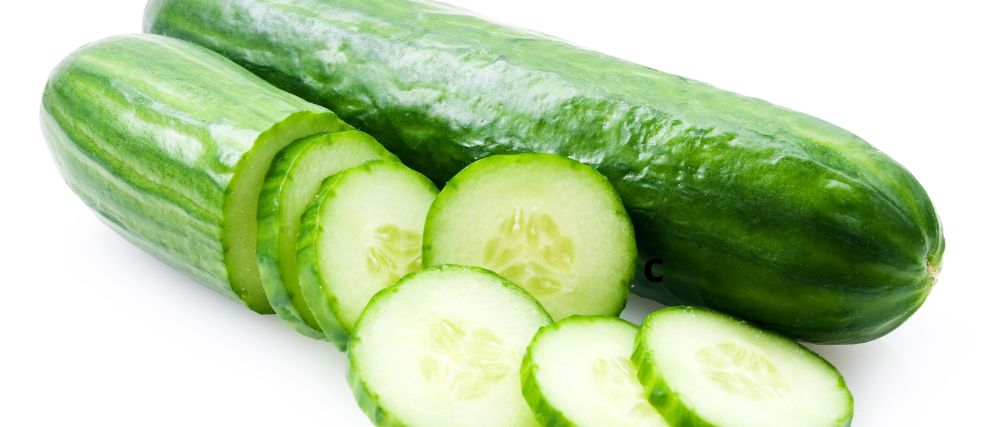Today my boss brought cucumbers to work from her garden for the staff at our office – and I took several! Both my wife and myself like them, and I just started thinking: What ARE the health benefits of eating cucumbers? Here are some things I gleaned…
Cucumbers are more than just a refreshing addition to your salad or a crunchy component of your sandwich. This humble vegetable, often overlooked, is packed with nutrients and offers a wide array of health benefits. In this article, we’ll explore why cucumbers are not just a culinary delight but also a powerhouse of health benefits.
Nutritional Profile
Cucumbers are low in calories and rich in water, making them an excellent choice for hydration. A typical cucumber is composed of about 95% water, which helps keep you hydrated and supports overall health. In addition to water, cucumbers contain a variety of vitamins and minerals, including Vitamin K, Vitamin C, potassium, and magnesium. They also provide antioxidants, which play a crucial role in protecting cells from oxidative damage.
Hydration and Weight Management
One of the primary benefits of cucumbers is their high water content. Staying well-hydrated is essential for maintaining bodily functions, including temperature regulation, joint lubrication, and digestion. Cucumbers can help you meet your daily water intake needs without adding extra calories, making them an excellent choice for those looking to manage their weight. Their low calorie and high water content create a feeling of fullness, reducing the likelihood of overeating.
Promoting Digestive Health
Cucumbers are an excellent source of dietary fiber, particularly in the form of pectin, which can aid in digestion. The fiber helps regulate bowel movements, preventing constipation and promoting a healthy digestive tract. Additionally, the water content in cucumbers helps soften stool and facilitates smoother passage through the intestines. The presence of cucumber’s fiber and water can also aid in detoxification by flushing out toxins and waste products from the body.
Supporting Heart Health
Cucumbers contribute to heart health in several ways. They contain potassium, a mineral that helps regulate blood pressure by counteracting the effects of sodium. Adequate potassium intake can help reduce the risk of stroke and cardiovascular diseases. Cucumbers also have a compound called cucurbitacin, which has been shown to have anti-inflammatory and antioxidant properties, potentially reducing the risk of heart disease.
Enhancing Skin Health
Cucumbers are well-known for their skin-soothing properties, often used in beauty treatments and facial masks. The high water content helps keep the skin hydrated, while the vitamins and minerals support skin health. Vitamin C, for instance, is essential for collagen production, which helps maintain skin elasticity and reduce the appearance of wrinkles. The antioxidants in cucumbers can also combat free radicals that contribute to premature aging.
In addition to their internal benefits, cucumbers can be applied topically to the skin to reduce puffiness and irritation. The coolness of cucumbers can help soothe inflamed or irritated skin, making them a popular remedy for eye bags and sunburn.
Strengthening Bones
Vitamin K, found abundantly in cucumbers, plays a crucial role in bone health. This vitamin helps with the absorption of calcium and the regulation of bone mineralization. Adequate Vitamin K intake is associated with a reduced risk of fractures and osteoporosis. Including cucumbers in your diet can contribute to meeting your daily Vitamin K needs, promoting stronger and healthier bones.
Boosting Immune Function
Cucumbers contain Vitamin C, an essential nutrient known for its immune-boosting properties. Vitamin C helps stimulate the production of white blood cells, which are critical for fighting off infections. It also acts as an antioxidant, protecting cells from damage caused by free radicals. By including cucumbers in your diet, you can support your immune system and enhance your body’s ability to ward off illnesses.
Managing Blood Sugar Levels
Preliminary studies suggest that cucumbers may help in managing blood sugar levels. Cucumbers contain compounds that can influence glucose metabolism and insulin sensitivity. For individuals with diabetes or those at risk of developing the condition, cucumbers can be a beneficial addition to a balanced diet. The fiber in cucumbers may also help stabilize blood sugar levels by slowing down the absorption of sugar in the bloodstream.
Supporting Mental Health
Cucumbers are a source of B vitamins, including B5 (pantothenic acid), which is important for mental health. B vitamins play a role in neurotransmitter function and energy production, which can affect mood and cognitive function. Additionally, the hydration provided by cucumbers helps maintain optimal brain function, as even mild dehydration can impair cognitive abilities and mood.
Conclusion
Cucumbers may often be underestimated in terms of their health benefits, but their impressive nutritional profile and array of health-promoting properties make them a valuable addition to any diet. From aiding in digestion and hydration to supporting heart health and skin vitality, cucumbers offer a wealth of benefits that contribute to overall well-being. Whether you enjoy them fresh, pickled, or in a smoothie, incorporating cucumbers into your daily diet is a simple yet effective way to enhance your health and vitality. So next time you reach for a snack or prepare a meal, don’t forget to include these refreshing green vegetables—they just might be your new favorite health booster.
Pretty cool vegetable, right?! Let me know what you think.

